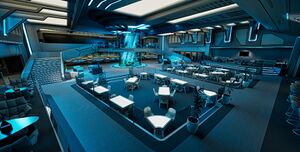USS Hypatia
- "Reserve your right to think, for even to think wrongly is better than not to think at all."
- —Hypatia - Ship's Dedication Quote
USS Hypatia is a Sutherland-class research cruiser serving in the Fourth Fleet's Task Force 17.
Named after one of Earth's most famous philosophers and astronomers from Alexandria, Egypt, Hypatia is a vessel of great size and significance. On the surface, she is equipped with all of the necessary equipment and personnel to carry out an array of scientific and exploratory endeavours, but beneath the surface hides something curious. Adjustments made to the vessel following the appointment of her commanding officer have equipped her with systems that allow her to fulfil a dangerous objective; to gather intelligence on Klingon movements near the Romulan Republic and perform reconnaissance patrols as required by Starfleet and their Romulan allies.
As the first of her name to ever grace Starfleet, it is up to Captain and crew alike to forge a name commensurate with the legacy of such an influential thinker and mathematician.
Mission Objectives
Once her shakedown is complete and the rest of her senior staff finalised, Hypatia will embark on missions with a primary focus on scientific exploration. She will, however, gather intelligence and reconnaissance data where required as part of her secondary mission profile. Missions she will conduct include:
- Utilising the vessel's advanced sensors and long-range capabilities to identify and investigate unexplored sectors of space, cataloguing new phenomena, stellar bodies, and potential resources.
- Conducting a wide range of interdisciplinary scientific studies, including astrophysics, exobiology, planetary geology, and stellar cartography, to deepen our understanding of the universe and its inhabitants.
- Conducting in-depth surveys of planets, moons, and celestial bodies to assess their geology, climate, atmosphere, and potential for colonisation or resource extraction. Study indigenous life forms and ecosystems to support conservation efforts and cultural understanding.
- Facilitating diplomatic missions and cultural exchanges with newly encountered civilisations, fostering peaceful relations and mutual understanding through scientific collaboration and shared knowledge.
- Providing assistance in disaster relief efforts, such as planetary natural disasters, medical emergencies, or humanitarian crises, utilising the vessel's medical facilities, transporters, and supply capabilities to support affected populations.
- Investigating ancient ruins, artefacts, and archaeological sites to uncover clues about lost civilisations, cultural heritage, and the history of the galaxy, preserving valuable knowledge and artefacts for future generations.
- Studying and analysing anomalies such as wormholes, subspace rifts, temporal disturbances, and gravitational anomalies to understand their nature, effects on space-time, and potential applications for travel or communication.
- Monitoring the health of ecosystems, celestial phenomena, and cosmic phenomena to assess the impact of stellar events, spacefaring activities, and climate change, contributing to efforts to preserve the natural balance of the cosmos.
- . Collaborating with other Starfleet vessels, scientific institutions, and allied organisations such as the Federation Science Council, Vulcan Science Academy, and Daystrom Institute to share knowledge, resources, and expertise in pursuit of common scientific goals.
Technical Configuration
Main Article: Sutherland-class Research Cruiser
Additional LCARS Database Articles
- Main Article: Auxiliary craft assigned to Hypatia
- Main Article: A complete listing of all decks on Hypatia
- Main Article: A tour of key facilities around Hypatia
The Alexandria Lounge
Perhaps the most spacious of all recreational facilities aboard Hypatia, the Alexandria Lounge (or simply Alexandria's, as it is more commonly known) is built across two levels and is the most spacious facility on the ship. With dozens of seating areas across both levels, with varying degrees of comfort and privacy, the room is a constant hive of activity for anyone and everyone aboard the ship. People come to work in a relaxed, but active environment, or they may come to sit and read while people mill about and conduct their business. Food is obtained from several replicators around the room, while bar snacks and beverages are available at the bar which is manned around the clock. The room's most exquisite feature is the large, floor-to-ceiling aquarium tank which is maintained by the science division and houses some thirty different species of marine life.
Auxiliary Craft
As Hypatia is named after one of Earth's most pivotal free thinkers and philosophers, the naming conventions for her auxiliary craft relate to famous humans from the same, or similar, period in history.
Shuttlebay 1 - Main Shuttlebay
Shuttlebay 1, or the Upper Shuttlebay, has been modified to house all of the auxiliary craft that make up Centaurus Flight. These auxiliary craft are made up of some of the most advanced small vessel designs ever to serve Starfleet.
Type 14 Shuttles
Archimedes, Euclid, Hippocrates, Pythagoras, Socrates, Zeno
Type 12 Shuttles
Cicero, Democritus, Empedocles, Heraclitus, Lucretius, Ptolemy
Shuttlebay 2 - Runabout Landing Bay
Shuttlebay 2 is the smallest of the auxiliary craft facilities on Hypatia and is the permanent home of two Arrow-class and two Argo-class runabouts.
Argo-class Runabouts
Ammonius, Plato
Arrow-class Runabouts
Aristotle, Theon
